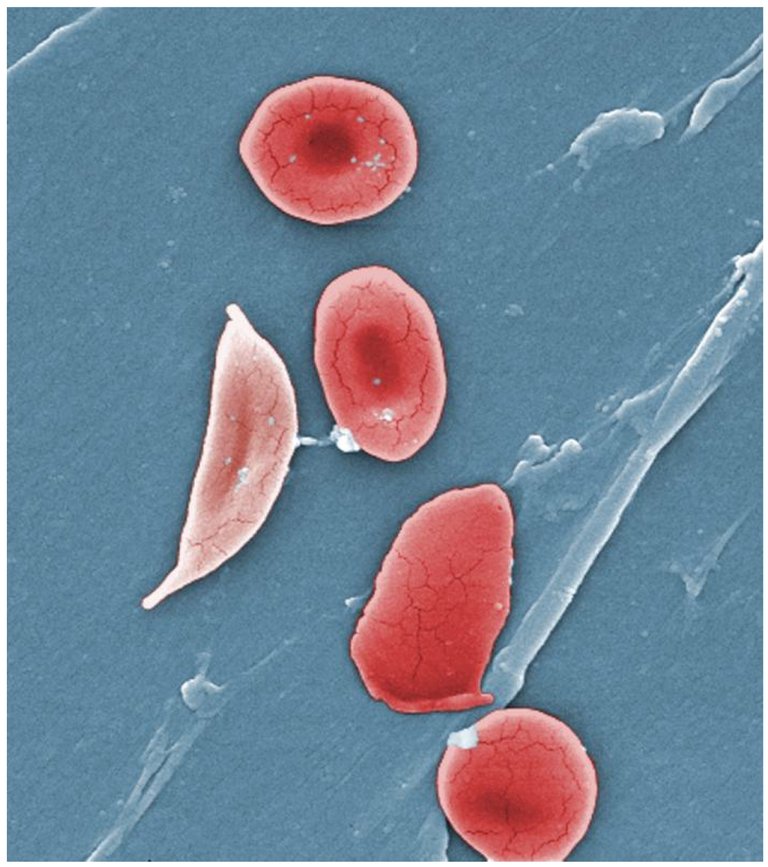You can only imagine the huge shock on my face when my younger brother told me that he had read about the sickle cell condition affecting only Africans.
Image source

You can't be serious. I said, do you mean people from other nations of the world do not experience sickle cell? There is no way I would have imagined that only Africans have sickle cell disease, so I decided to read up on it.
I don't have to go into details about sickle cell again in this post because I have written a lot about it in this post.
The first case of sickle cell in the United States was reported in 1904. It was seen by Noel Walter, who was a 20-year-old dental student at the time. He met Dr. James B. Herrick, who was a cardiologist and professor in medicine at the time.
Dr. Herrick, however, passed the case to his intern, Dr. Ernest, who carried out blood work on Herrick and noticed the unusual red blood cell shape; he immediately informed his physician, Dr. Herrick, who now took keen interest in the unusual situation.
The doctor published his first documented case study on sickle cell disease by November 1910. Noel continued to receive treatment from the doctor for the next three years until he returned to Grenada after his graduation to practice dentistry.
Unfortunately, Noel died from pneumonia in 1916. Even if the first case of sickle cell in the United States was with Noel, its history dates back to Africa.
The sickle cell mutation happened many years ago; the purpose was to protect people against malaria. Bear in mind that malaria is a very serious infection type that affects certain people in some parts of the world; Africa, India, and sub-Saharan are not exempted.
The people with sickle cell most likely will not get malaria, and even if they do, they wouldn't die as a result of it.
Even if the origin of sickle cell was from Africa, genetic mixing has happened a lot over the years.
Most Americans who have the sickle cell trait are often those with Black or Latinx ancestry.
Now, when babies are born in the United States, they are screened for various things, and amongst them is sickle cell; it has become a very common disease that now affects almost one in 2,000 children screened.
In Africa, the local medicinal literature around the 1870s, back then, described the affected children as "ogbanje". The occurrence of children getting sick often and then infant death was common back then, and it was considered a spiritual issue, as they called them.
Sickle cell diseases are of two types, SS and SC, the letters describing the type ohemoglobin;n, normal hemoglobin is called hemoglobin A.
SS is the most common and the most serious form, accounting for the majority of sickle celcases..
SC is a not-so-common type but could get more severe as advancement in age happens.
It was Linus Pauling and his colleagues who first demonstrated that sickle cell diseasoccurreded due to the abnormality in the red blood cell. The origin othe mutation that led to the sickle cell gene was derived from four independent mutational events.
They were derived in Africa, and the fourth one is from Central India or Saudi Arabia. This happened between 3,000 and 6,000 years ago.
Dr Charle F. Whitten is not a name to be swept under the rug in the world of sickle cell and its awareness. In the early 1970s, he brought out the idea of the Sickle Cell Disease Association of America (SCDAA). This was after he realized how lacking the care and facilities for those suffering from sickle cell disease were.
There have been significant improvements in the sickle cell space with lots of modernization done to make life better for the victims. However, there is currently no cure for the disease.
Although, the bone marrow transplant has been a success case for a few patients, it is not widely accepteyet dueue to the risk involved.
Conclusion
My brother may be correct about sickle cell disease being coined from an African race, but not that only Africans are affected by it. Right now, races and cultures have mixed efficiently, and we can almost not take out the origin of one without the other.
References
brownhealth.org/be-well/sickle-cell-disease-
redcrossblood.org/donate-blood/blood-types/diversity
 Hi, I am Tobi, a writer, speaker, relationship blogger, and lover of good music. I love making friends and learning from people.
Hi, I am Tobi, a writer, speaker, relationship blogger, and lover of good music. I love making friends and learning from people.
Thanks for your contribution to the STEMsocial community. Feel free to join us on discord to get to know the rest of us!
Please consider delegating to the @stemsocial account (85% of the curation rewards are returned).
Thanks for including @stemsocial as a beneficiary, which gives you stronger support.